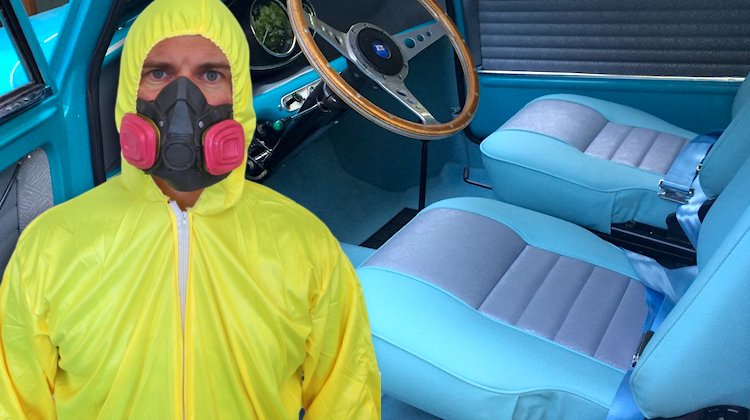The global coronavirus pandemic has forced countless businesses, large and small, to shut down. Don’t let your auto trim shop become its next victim.
The public is understandably panicked by the virus, which has already killed thousands of people worldwide and shows no signs of abating. But there are steps you can take to minimize risk and exposure.
Follow these 8 steps to protect your business and employees from coronavirus:
1. Give your team a lesson in hygiene
Coronavirus wouldn’t spread so quickly if people just listened to experts.
The Centers for Disease Control and Prevention (CDC) outlined five simple things we can all do to prevent exposure. Share these hygiene tips with your team to keep your trim shop virus-free:
- Wash your hands often with soap and water for at least 20 seconds
- Don’t touch your eyes, nose or mouth with unwashed hands
- Avoid close contact with people who are sick or may become sick
- Cover your mouth and nose with a tissue when you cough or sneeze, throw that tissue away and wash your hands
- Clean and disinfect all surfaces that are regularly touched and shared, including phones, doorknobs, common tools and sewing stations
2. Wipe down customers’ cars
Every car interior is a cesspool of germs. In fact, a recent study found that the average steering wheel is four times dirtier than a public toilet. With coronavirus spreading quickly, they could be even dirtier.
As soon as a car enters your shop, wipe down its interior with isopropyl alcohol (unless it’s leather). Make sure to cover areas that get touched a lot — like steering wheels, arm rests, shifters, buttons, etc. Wear rubber gloves and a face mask while you do it.
For a list of EPA-approved disinfectants that kill coronavirus on other surfaces, check out this article.
3. Meet customers ‘by appointment only’
The potential to spread coronavirus increases with every new person that walks into your shop — that’s why experts are encouraging people to stay home.
Trim shops that leave their doors open and receive a lot of foot traffic are susceptible to increased exposure. To limit that risk, consider locking your door and meeting customers by appointment only.
This way you can vet callers and choose to meet those with serious intentions. Who knows, you might actually like it.
4. Offer estimates by phone or email
Most auto upholstery work is too specialized to give quotes over the phone. But you can certainly give estimates or ballpark figures.
You can even encourage customers to text or email you photos or videos for more accurate assessments. It won’t be spot on, but as long as you’re clear about that, it shouldn’t be a problem. Besides, most callers are just price shopping anyway.
If you don’t know the difference between quotes, estimates and ballpark figures, read this article. It’ll save you lots of headaches.
5. Stop shaking hands with customers
The fastest way to catch coronavirus is to shake hands with an infected person and then touch your face. Don’t do it.
If you must touch a customer, go for a fist or elbow bump. Most people will understand. Afterall, everyone is freaking out just the same.
Whatever contact you have with a customer, make sure to use hand sanitizer directly afterwards. It’s not rude, so long as you offer them a squirt too.
6. Make your bathroom ‘for employees only’
Trim shops that allow customers to use their bathrooms should reconsider, as coronavirus can live on surfaces “for a few hours or up to several days,” according to the World Health Organization.
Cold, moist surfaces, like those found in bathrooms, are a particularly welcoming environment for coronavirus, says Luis Ostrosky, a professor and vice chairman of internal medicine at McGovern Medical School in Houston, Texas.
That’s why experts are warning people to not use public bathrooms, if they can help it, and avoid sharing facilities with infected people.
7. Tell sick employees to stay home
If your shop can afford to offer employees paid sick leave, do it — even if it’s just a temporary measure.
Without paid sick leave, employees are likely to mask their illnesses and power through the workday. If that happens, your entire staff and their respective families can be exposed to whatever viruses someone is carrying.
It’s cheaper to give an employee 2 to 3 days to get diagnosed and recover from a cold than it is to shut your entire shop down.
8. Get business interruption insurance
In the event that you or an employee contracts coronavirus, your shop will shut down.
Before this happens, inquire with your insurance provider about business interruption insurance. It’s intended to protect businesses against revenue losses sustained as a result of catastrophe. You may already be covered and not even know it.
This is especially important if your business is located in an area with a high rate of infection. This map will show you how bad the outbreak is in your state.
For more coronavirus prevention tips, visit the CDC’s website.

https://www.smh.com.au/business/banking-and-finance/insurance-catastrophe-for-businesses-as-coronavirus-not-covered-20200312-p549br.html